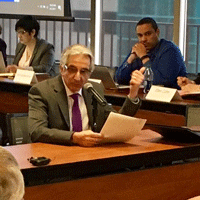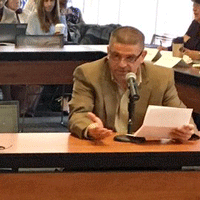“The board showed that they’ve heard the voices of educators and parents,” said AFT Connecticut President Jan Hochadel. “We’ve said all along that teachers support accountability, but that we shouldn’t be judged on subjects we don’t teach or by tests that weren’t designed for that purpose. This change goes a long way to correct an inappropriate approach that would have ultimately hurt our students’ learning opportunities,” added Hochadel, who taught physics and science in the state’s technical high schools.
Hochadel’s comments refer to SBOE members’ 6-2 vote (with one abstention) to approve new guidelines adopted last month by the Performance Evaluation Advisory Council (PEAC), which includes AFT Connecticut. Among the panel’s recommendations were a defined limit on the use of results from standardized state mastery exams like the Smarter Balanced Assessment Consortium (SBAC) test. Specifically, their scores can be used in goal setting and professional learning for teachers but will be restricted from measuring goal attainment or for calculating an educator’s evaluation rating.
Click here for press coverage of the board’s action.
The vote took place at the SBOE’s regular monthly meeting where education advocates and union leaders spoke in favor of PEAC’s proposed policy changes during public comment. They made compelling arguments about how limited high stakes standardized tests are when it comes to informing instruction and providing a complete picture of student achievement.
“We must be vigilant of work practices that might potentially stack the deck against retention,” New Britain High School biology teacher Sal Escobales (left in photo at right) told board members in testimony delivered jointly with his district’s chief talent officer. The president of our AFT Connecticut-affiliated New Britain Federation of Teachers also added that “fair and equitable evaluation practices becomes even more important” in developing a “system of evaluation that produces the best possible conditions for teacher recruitment.”
Click here to watch Escobales’ testimony.
 “Placing emphasis on one high stakes test creates an unhealthy focus; an obsession to ‘pass the test,'” veteran math educator, PEAC member and New Haven Federation of Teachers president David Cicarella (left) told the board. “Schools become ‘test prep factories,'” he added. Cicarella pointed out how the SBAC in particular doesn’t measure growth in grades or subject areas taught by 80% of Connecticut’s educators. He emphasized that “art, music, and world languages are not tested areas.”
“Placing emphasis on one high stakes test creates an unhealthy focus; an obsession to ‘pass the test,'” veteran math educator, PEAC member and New Haven Federation of Teachers president David Cicarella (left) told the board. “Schools become ‘test prep factories,'” he added. Cicarella pointed out how the SBAC in particular doesn’t measure growth in grades or subject areas taught by 80% of Connecticut’s educators. He emphasized that “art, music, and world languages are not tested areas.”Click here to watch Cicarella’s testimony.
 “A single test does not take into account individual student needs from day to day,” Steve McKeever (right), a science teacher at Woodrow Wilson Middle School in Middletown, told the board. “Some are hungry and only get meals while at school,” he explained, adding, “some are homeless or move often in order to have a home.” McKeever, a Middletown Federation of Teachers vice president, helped the board understand the broader concern, pointing out that standardized tests alone overlook “what it takes to educate the ‘whole’ child.”
“A single test does not take into account individual student needs from day to day,” Steve McKeever (right), a science teacher at Woodrow Wilson Middle School in Middletown, told the board. “Some are hungry and only get meals while at school,” he explained, adding, “some are homeless or move often in order to have a home.” McKeever, a Middletown Federation of Teachers vice president, helped the board understand the broader concern, pointing out that standardized tests alone overlook “what it takes to educate the ‘whole’ child.”Click here to watch McKeever’s testimony.
The requirement that mastery exam scores be used as part of the calculation for teacher evaluations was set to take effect statewide during the 2017-18 school year. In addition to our advocacy efforts through PEAC since 2012, union members last year supported legislation that would have decoupled student tests and educator assessments. With their adoption of the new guidelines, the SBOE has effectively implemented the policy changes promised by the proposed bill.

